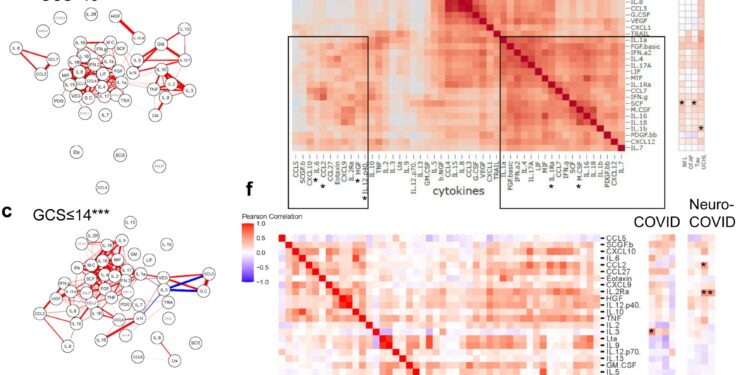Immune mediators are extremely elevated and correlate with different markers of brain damage at different times. Credit: Natural communications (2023). DOI: 10.1038/s41467-023-42320-4
A new study details that markers of brain damage are present in the blood several months after COVID-19 infection, even if blood tests for inflammation are normal. The full article, “COVID-19-related parainfectious brain injury persists at follow-up despite attenuated cytokine and autoantibody responses,” is available at Natural communications
The findings represent a major outcome from the COVID-19 Clinical Neuroscience Study led by the University of Liverpool and King’s College London (COVID-CNS) and also involves scientists from the ISARIC4C consortium, the Pandemic Institute and the NIHR BioResource.
Professor Benedict Michael, Principal Investigator and Director of the Infection Neuroscience Laboratory at the University of Liverpool and Honorary Consultant Neurologist, The Walton Center NHS Foundation Trust, said: “During the COVID-19 pandemic, it has become It was evident that neurological complications occurred in a significant proportion of hospitalizations. patients and even in those with mild COVID-19 infection.
“Although some neurological ‘symptoms’ were often mild (headache and muscle pain (myalgia)), it became clear that new, more significant and potentially life-changing neurological ‘complications’ were occurring, including encephalitis (brain inflammation) , seizures and strokes.”.
The COVID-CNS study analyzed samples from more than 800 patients hospitalized with COVID-19 in England and Wales, half of whom had new neurological conditions. Here, researchers measured brain injury markers, serum inflammatory proteins (cytokines), antibodies, and brain injury (neuroglial) proteins.
Analysis of these shows that during the acute phase (when symptoms develop rapidly), there is production of key inflammatory proteins and markers of brain damage, but surprisingly, robust evidence of biomarkers of brain (neuroglial) damage ) in COVID-19, even months after discharge from hospital.
Importantly, this was greater in patients with neurological dysfunction in the acute phase of the disease and continued during the recovery phase in patients who suffered acute neurological complications.
Inflammatory markers are associated with abnormal immune responses in the acute phase of the disease, and researchers suggest they may represent targets for the treatment of COVID-19 and other infections causing acute brain dysfunction.
“Our study shows that markers of brain damage are present in the blood months after COVID-19, and particularly in those who have had a COVID-19-induced brain complication (e.g. inflammation or stroke ), despite the resolution of the inflammatory response in “Professor Michael said.
Head of the Department of Clinical Infection, Microbiology and Immunology, Professor Aras Kadioglu, said: “Liverpool has been at the forefront of research throughout the pandemic and this important new study has identified markers of ongoing brain damage in those who developed neurological complications during COVID-19. 19, even months after their release from the hospital.”
“The Liverpool team led by Professor Benedict Michael and colleagues are now working to understand what this means for the cognitive function, independence and recovery of those affected.”
Professor Leonie Taams, from King’s College London, said: “It has been a great privilege to be part of this important interdisciplinary research led by the COVID-CNS consortium. By bringing together research in immunology, neurology and infections, we have been able to reveal a number of biomarkers associated with neurological complications of COVID-19. This work may help set the stage for elucidating the possible underlying mechanisms of these complications.
More information:
Michael, BD et al, Para-infectious brain damage from COVID-19 persists at follow-up despite attenuated cytokine and autoantibody responses. Natural communications (2023). DOI: 10.1038/s41467-023-42320-4
Provided by the University of Liverpool
Quote: Persistent brain damage caused by COVID-19 may not always be detected by routine tests (December 22, 2023) retrieved December 22, 2023 from
This document is subject to copyright. Apart from fair use for private study or research purposes, no part may be reproduced without written permission. The content is provided for information only.



